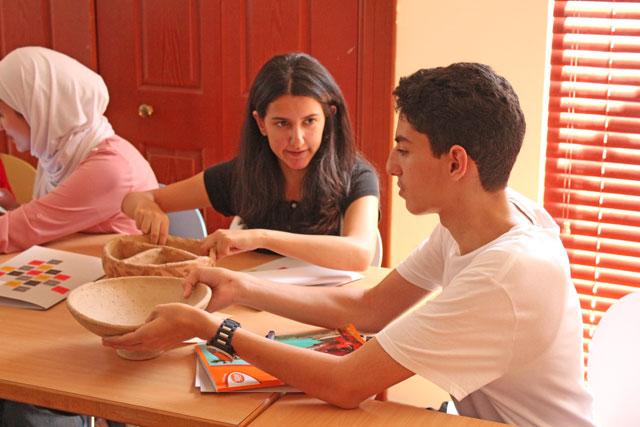You are here
‘German language becoming opportunity for professional development’
By Sascha Luebbe - Feb 12,2015 - Last updated at Feb 12,2015
AMMAN — Although architect Labib Abdelmalek enjoys learning any new language, German is especially important to him — it means the future.
The University of Jordan graduate has so far taken six courses in the language and is hoping to use the skills he acquired to pursue a master’s degree in architecture in Germany.
“I like studying languages in general… yet, I especially like German. The grammar is so expressive,” Abdelmalek, who graduated from university seven years ago, told The Jordan Times.
More Jordanians like him are interested in mastering German for similar reasons, according to Agathe Simonis, of the Goethe Institut.
“Germany has become an attractive country for many reasons,” Simonis said. “At many universities there are no tuition fees. Also there is a huge demand for professionals in Germany, especially for physicians.”
The growing interest in Germany, she noted, is evident in the number of students learning German at the institute, explaining that between 2010 and 2014, the number of students has almost doubled.
Schools have taken note of that, and started to offer German classes.
There are currently 10 schools teaching German in Jordan. Of these, three have joined Germany’s Partner School Initiative (PASCH).
The programme is a global network that promotes learning German as a foreign language. It was initiated in 2008 and today includes more than 1,500 schools from different countries all over the world.
The Ahliyyah and Bishop School, Al Asriyya School and Jubilee School are members of PASCH, according to Simonis, who also coordinates the initiative in Jordan.
In order to become part of PASCH, schools have to fulfil certain requirements, she said.
“Teachers have to attend five advanced training courses a year; students have to partake in different workshops; and the curriculum of the schools has to be adapted as well.”
Simonis organises the workshops for teachers and students, coaches the school organisation staff and supervises the lessons. Apart from language classes, activities also include singing, theatre and photo workshops.
“Schools that are part of the network receive special support from the German government,” she explained.
“Apart from advanced methodological and didactic training workshops and language courses for teachers, the school library will be equipped with learning material. Furthermore, the teachers receive a fellowship to develop their skills in Germany.”
Currently there are eight German language teachers working at the three PASCH member schools. Two of them are Germans, and the rest are Jordanian or Syrian. They teach students from 7th to 12th grade.
Students from the PASCH schools who want to study at the German-Jordanian University (GJU) can skip some of its German classes depending on the level they have achieved.
Established in 2005, the public university’s curriculum includes German language classes as well as an introduction to German industry.
“Among all universities worldwide, the GJU has the largest German language department,” Michael K. de Jong, director of the GJU Language Centre, told the Jordan Times.
The university has 72 teaching staff members.
The university is modelled on the German applied-sciences model that places the main focus on putting knowledge into practice, according to de Jong.
All students have to study part of their majors in Germany and gather practical job experience there, which gives them an edge in the labour market, the university official added.
“Almost all GJU students find jobs when they graduate,” de Jong said.
The story was done as part of the Goethe Institute's journalistic exchange project "Close-Up"
Related Articles
AMMAN — The Islamic Educational College was announced as the fourth Jordanian school being admitted to the PASCH network in Jordan, accordin
AMMAN — Fourteen students interested in Jordanian cultural heritage, last week attended a workshop organised by the German Protestant Instit
German Ambassador to Jordan Ralph Tarraf on Thursday welcomed two Amman-based schools into Germany’s Partner School Initiative (PASCH), according to an embassy statement.

















